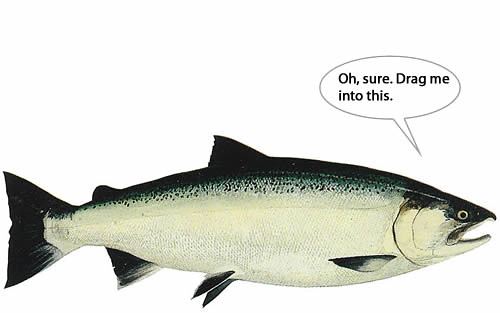Just Write! Ian Lurie on Why You Have to, Even If You Think You Don’t
Ian Lurie is Chief Marketing Curmudgeon and President at Portent Interactive, an internet marketing company he started in 1995. Ian started practicing SEO in 1997, and has been addicted ever since. As a steadfast fan of Ian’s candid and wicked-smart expertise, I’m delighted to feature his words of wisdom today. – Heather
It amazes me how many business owners and employees think good writing is optional. Some of my favorite justifications:
“My customers don’t read”
Really? Do you sell to reptiles? Illiterate rodents? Tribbles, perhaps? ‘Cause otherwise, your customers read. Every day. Even if they don’t want to. They read signs. They read directions. They read e-mails.

If you sell anything, they read your e-mails regarding orders, sales, specials, etc.
If you provide a service, they read the reports and invoices you send ‘em.
And I guarantee they go to the Googles now and then to find an answer to a question.
Your customers do read. You’re confusing reading with reading books, or reading for fun.
The fact is, if your customers “don’t read”, then great writing is even more important. Your customers don’t want to spend a ton of time deciphering crappy writing. You need to get to the point with clear, directive prose. The best business writing goes unnoticed—all the reader remembers is the idea you were trying to communicate.
So, if your customers don’t read, you have to write that much better.
“My business doesn’t require any writing—it’s not that kind of company”
I. Uh.
Hmm.
I’m never sure how to answer that. When someone says that, my frontal lobe makes a kind of popping sound, and I black out for 30-45 seconds. Whatever happens after that must be bad, because when I come back to reality, the speaker looks like they got slapped with a rotten salmon.
If you make rubber grommets, you still need to explain why your rubber grommets are worth buying, right?
“Oh, but rubber grommets are a commodity. No one shops for them.”
Then you need to convince them to start shopping. That process starts with the first person who sees your site, if you’ve explained why you’re important to them. If you don’t bother, then yeah, they stop shopping, and go back to buying from the same place they always have.
There must be a reason you’re in the grommet business. If it’s just to sell to existing customers until they leave, I suggest you find a new line of work.
It’s up to you compel the reader. Saying “You’re not that kind of company” is just an excuse.
“My potential customers don’t use search engines, so I don’t need writing on my site.”
Surrreeee. It’s true. 10 or 12 North Americans out there never, ever search for stuff online. The rest of them, though, use Google, or Bing, or their computer’s search tools. Or, when they get to your site, they use your onsite search engine. Or, at a minimum, they’re going to search an individual page, with their eyes and brains, in an effort to figure out if they’re in the right place.
In all those cases, well-written copy that’s fully descriptive will help them find what they need. Which, in the end, is what turns visitors into customers.
At some point, customers search. Be ready when they do, with really good writing.
“No one’s going to read 500 words on shavers”
OK. So don’t write 500 words.
If you can present a compelling argument for your product in 25 words, do it. I don’t want 500 words where 5 will do.
“Writing” doesn’t mean “word diarrhea”. It means “communication”.
Yes, at some point, search engines get involved, and then it’s possible you’ll have to write more. That’s when you think about:
- The questions you most often hear;
- Special uses of your product;
- Help/advice for best product use;
- Your pet peeve (like people who think they don’t have to write);
- Big changes in your industry that might have your customers wondering.
You can always drill deeper into a subject. There’s always someone who wants to read a 1,500 word treatise on the origin of the electric razor.
Just write!
No matter what business you’re in, you need to write:
- Explanations of services, products, invoices, hours and policies.
- Direction telling the reader what to do next, how to get help, etc.
- Your case: Why customers should like you more than your competitor.
- Communications with individual customers, via e-mail, Twitter, Facebook or whatever comes next.
It may be 10 words. It may be 10,000. It’s most likely somewhere in between.
Just write. The more you do it, the better you get at it. And, even if they don’t notice, your customers will appreciate it.
For more of Ian Lurie’s smarts, raves, and rants, check out his Conversation Marketing blog. He’s also published several reader-friendly, no-nonsense ebooks on SEO copywriting, including The Unscary, Real World Guide to SEO Copywriting.



Excellent post. Any business with the mentality that their customers do not read needs to change their way of thinking. All the doubters out there need to take a good look at their competitors and leaders of their industry and see how they use writing to draw in customers. Well written copy engages, interacts with, and guides potential customers on what to do next, such as a call to action. There are plenty of freelance writers out there who are more than willing to do the writing for these businesses.
Ian! Love it … it’s something I wish I had written. Laughed OL!